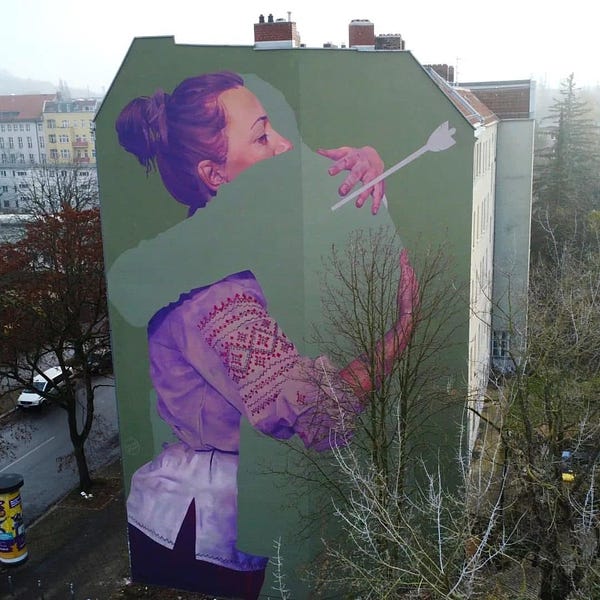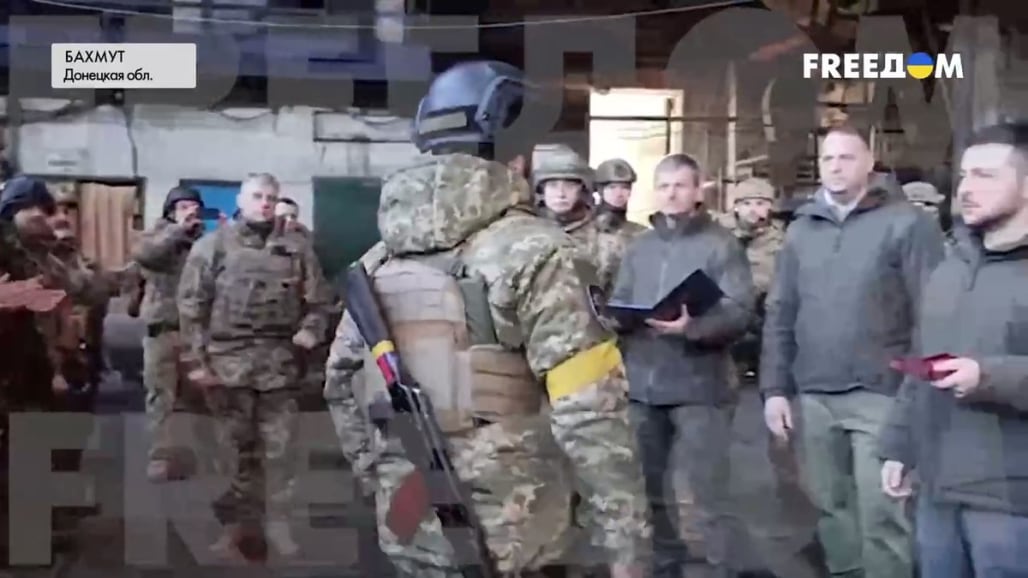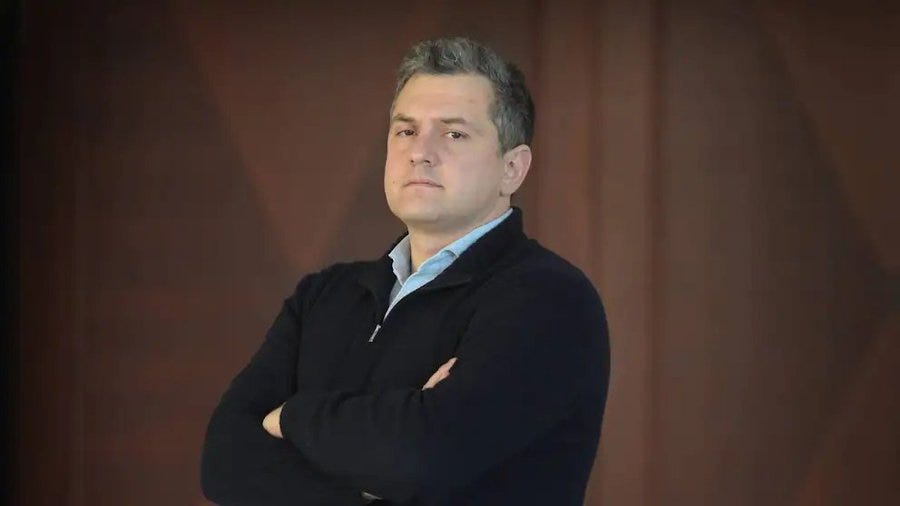Dec 20 Buonasera Mag
Day 300: Bakhmut Zelensky UAEnergy Shmyhal Danilov Chuvashia Zaluzhnyi Lukashenko CND Estonia Moldova Wallace Denmark-A&P-Halushka Giles Tendar Zabrinsky Koffler Vogel Borger
300 days of war…
EA Worldview’s Ukraine Up-date- hop over to Scott’s amazing hourly Ukraine up-date page. I’ll fill in with some bits and bobs.


Stories we’re following…
President Zelensky has visited the frontline city of Bakhmut to meet military representatives and hand out awards to soldiers, his office has said.
Zelensky: Russia receives 250 more Iranian-made kamikaze drones. Russian forces launched 35 Iranian kamikaze drones at Ukraine on Dec. 19, injuring three people. Thirty drones were reportedly shot down. Russia has repeatedly attacked critical infrastructure across Ukraine with missiles and drones since early October, killing dozens of people and causing power outages.
'Bakhmut remains hottest point on entire front line.' President Zelensky said that Bakhmut in Donetsk Oblast remains the "hottest point" out of the entire 1,300-kilometer front line as Russian forces relentlessly try to break Ukraine's defenses in the city.
Ukraine’s energy system ‘in difficult situation’ due to Russian attacks. Emergency power outages have been introduced in 10 Ukrainian oblasts and the city of Kyiv, the state grid operator Ukrenergo said.
Ukrainian PM Denys Shmyhal warns, “Russian terrorists will do everything to leave Ukrainians without electricity for the New Year. It is important for them for Christmas and the New Year to take place in darkness in Ukraine. That’s why we should prepare for new attacks.”
Danilov: Russia has missiles for 3-4 more mass attacks on Ukraine before running out of stocks. “They have already passed the limit (of rockets’ amount) that according to the regulations they should have kept," National Security and Defense Council Secretary Oleksii Danilov. He added that exhausting the missile supplies is “unacceptable” for the military as they “may have completely different challenges, and they have to leave at least some reserve.”


Ukrainian intelligence: Putin postponed Ukraine invasion date three times. Putin delayed Russia's planned invasion of Ukraine on three occasions after consulting with Valery Gerasimov, the Chief of the General Staff of the Russian Armed Forces, and Defense Minister Sergey Shoigu, according to Vadym Skibitsky, a deputy head of Ukraine's military intelligence agency.
Skibitsky stated that the Russian Federal Security Service had urged Gerasimov to move forward with the invasion, and that Russia had invested a significant amount of resources in its preparation. “According to our information, for the third time the offensive was postponed in mid-February,” he said.
In a video message addressed to Russia’s security services, Putin said the situation in the four Russian-occupied Ukrainian regions was “extremely complicated”, and urged security agencies to intensify their efforts to identify “traitors, spies and diversionists”.
Boom.
Zaluzhnyi urges Zelensky to sign law increasing consequences for desertion. According to Zaluzhnyi, the current gaps in legislation, which only allow for fines or probationary sentences, are unfair and contribute to the loss of personnel, territory, and civilians on the front lines.
Reuters: US accuses UN of yielding to Russian threats over Iranian-made drone inspections. The United States accused UN Secretary-General Antonio Guterres of giving in to Russian threats in refusing to send officials to Ukraine to inspect the Iranian-made drones Russia has used to attack Ukraine, Reuters reported.

Canada to seize assets of sanctioned Russian billionaire Abramovich. Canadia announced it would start seizing approximately $26 million from Granite Capital Holdings Ltd, a firm owned by Roman Abramovich. “This is the first time that Canada is using its new authorities that allow the government to pursue the seizure of assets belonging to sanctioned persons,” the statement reads.
Moldovan intelligence: "Very high" risk of new Russian offensive towards occupied Transnistria. Alexandru Musteata, head of Moldova's Security Service, told the TVR-Moldova television channel that Russia still aims to secure a land corridor through Ukraine to reach Transnistria, which hosts 1,500 Russian troops and a large arms depot.

Russia intends to give Iran advanced military components in exchange for hundreds of drones, British defence minister Ben Wallace said today. “Iran has become one of Russia’s top military backers,” Wallace told parliament as part of a statement on the Russia-Ukraine conflict.
Ukraine has revoked the press accreditation of Danish state broadcaster DR’s correspondent, Matilde Kimer, over allegations of having spread Russian propaganda, DR has said, prompting denials from both the journalist and her employer. At a December meeting in Kyiv, the Ukrainian Security Service (SBU) alleged that she was spreading Russian propaganda and that her social media posts appeared to sympathise with Russia, Kimer told Reuters. DR’s foreign policy editor, Niels Kvale, called the allegations “completely undocumented and crazy” and Kimer herself denied biased reporting.

Rebeka Koffler, 3 reasons why the CIA will not order Putin’s assassination- The New York Post
As a former Defense Intelligence Agency officer specializing in Russia, I often am asked why the United States doesn’t just take out Vladimir Putin.
First, the US Constitution prohibits the use of lethal force outside of armed conflict zones unless it is used against an individual who presents a concrete, imminent threat of grave harm to the United States and is participating in hostilities against the homeland — and only as a last resort. Putin does not meet this requirement.
Second, even if the CIA did get authorization for such an operation, it would be extremely difficult to execute. Putin and the members of his inner circle are under constant protection by the Federal Security Service. Putin himself is protected by guards from the Presidential Security Service, or “People in Black.” National Guard — or Rosgvardia — is responsible for the survival of Putin’s entire regime.
Third, as an operative with decades of service in the KGB — one of the world’s most brutal intelligence services — Putin is highly primed for an attempt on his life, and he has likely concocted various contingency plans to ensure his survival.
Nathalie Vogel- Lawfare and the Case of General Giorgi Kalandadze
Last year of this day saw the unjustified arrest and the illegal detention of Ukrainian citizen, Georgian born General Giorgi Kalandadze. He was the victim of an act of lawfare by the Georgian government on behalf of the Russian Federation which had been pursuing him in vain for over a decade.
The arrest warrant that had previously been dismissed by Interpol was based on a bilateral request which was honored by the Ger gov. It was backed by the following entities: BKA representative in Georgia, Georgian liaison counterpart in Berlin, the Ger MFA and the German embassy in Tbilisi, which the then Ambassador Hubert Knirsch denied but which previous email exchanges uncovered during the investigation confirmed.
Giorgi Kalandadze is a genuine Ukrainian patriot who is determined to defend Ukraine from Russian invasion. He holds no grudge because of what German authorities did to him, he is of the forgiving kind. I AM NOT.
Julian Borger- ‘Our weapons are computers’: Ukrainian coders aim to gain battlefield edge- The Guardian
Inside, the weapon glows from a dozen computer screens – a constantly updated portrayal of the evolving battlefield to the south. With one click on a menu, the map is populated with hordes of orange diamonds, showing Russian deployments. They reveal where tanks and artillery have been hidden, and intimate details of the units and the soldiers in them, gleaned from social media. Choosing another option from the menu lights up red arrows across the southern Zaporizhzhia region, showing the progression of Russian columns. Zooming in shows satellite imagery of the terrain in sharp detail.
It is called Delta, a software package developed by Ukrainian programmers to give their armed forces an advantage in a contest of which side can see the battlefield more clearly and therefore predict the enemy forces’ moves and strike them faster and more accurately.
While many scenes from the war in Ukraine look like a throwback to the first world war, with muddy trench networks and blasted landscapes, the conflict is also a testing ground for the future of warfare, where information and its dissemination in instantly usable form to individual soldiers will be critical to victory or defeat.









